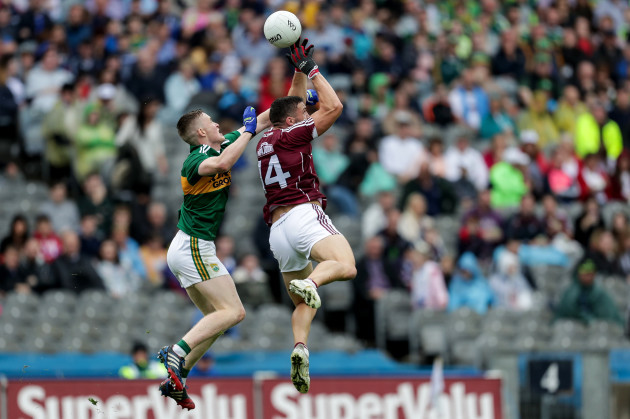WE’RE LESS THAN a year into John Horan’s reign as GAA president, but already significant steps have been taken to improve two key areas of the Association – the fixtures calendar and the spectacle of Gaelic football.
At the GPA’s 2017 annual report last week, the body’s new chief executive Paul Flynn revealed they’re part of a group involving the GAA, CPA and Higher Education Committee that is currently reviewing the overall fixtures calendar at club, college and county level.
Getting all the relevant stakeholders into a room to come up with a proper fixtures schedule could be the most important achievement of Horan’s reign.
Yesterday, the Standing Committee for Playing Rules (SCPR) announced five proposed changes to Gaelic football with the aim of making the game more attractive to watch.
The committee, installed by Horan after he took over from Aogan Ó Fearghail in February, is chaired by Ulster University academic and former Derry dual star David Hassan.
It includes former Cork football manager Brian Cuthbert, Cork secretary Frank Murphy, GPA president and ex-Galway hurler David Collins, former Meath footballer Seamus Kenny, Antrim’s Ulster Council representative Alec McQuillan, former Leinster chairman Michael Delaney and Croke Park games manager Pat Daly.
The five proposed rule changes are certainly radical and would drastically alter Gaelic football as we know it. They are:
- A three consecutive hand-pass limit
- Forward-only sideline kicks
- A sin-bin for a black-card offence or double yellow cards
- A mark inside the 20-metre line
- A new kick-out protocol
Discussions are set to take place between the SCPR and players, managers and referees during the month of October. If approved, the rule changes would be played on a trial basis during the 2019 Allianz Leagues and could be written into law in time for the 2020 All-Ireland SFC.
Challenge games have been organised over the next couple of weeks to analyse how these changes would affect the game. Further tweaks and alterations to the rule changes are likely before they go in front of the GAA’s Management Committee for approval at the end of the month.
Inter-county managers are likely to strongly oppose the rules being trialed during the league, which many counties view as their most important competition.
It’s important to note that all five proposed changes are highly unlikely to be approved together. At most, one or two rule changes coming in is a far more realistic expectation, given they must pass a vote at Congress.
The negative reaction to the proposals on social media has been a little over the top, but it comes with the territory. It’s likely football hasn’t become as bad to watch as social media would have you believe either.
Scoring rates, skill levels and fitness standards continue to rise, meaning the game is in a relatively healthy state. That said, it has started to resemble basketball.
If a team doesn’t get a scoring attempt away within the first eight or 10 seconds of an attack, the defending team is generally able to filter 12 or 13 men behind the ball.
Attacking teams are now coached not to carry the ball into the tackle or give away an unnecessary turnover, so instead they work the ball back and forth probing for a gap and a high percentage shot at goal.
What ensues is the sort of sideways passing passages of play that sucks the life out of an atmosphere and makes the game dull for spectators. Superior fitness levels and tactical insight now means that any half-forward line worth its salt will be back behind the ball if an opposition attack is slowed down.
Carlow manager Turlough O’Brien has been extremely critical of the proposed rule changes. Then again, the Barrowsiders are probably the most defensive inter-county team out there, so it’s easy to see why they wouldn’t want the game to be opened up.
Gobsmacked with proposed rule changes .... and trialing them in the NFL???????
— Turlough O Brien (@TurloughCarlow) October 3, 2018
Indeed, Hassan has stated that the idea behind the changes is to “promote attacking principles.”
So if we take it on the basis that the changes are supposed to make it easier for forwards, the three consecutive handpass limit makes little sense.
Instead, it would encourage teams to drop bodies behind the ball and wait for a mistake. It would also rule out the sort of flowing hand-passing team move that Corofin scored in this year’s All-Ireland club final.
Handpassing is not the enemy of attacking play, it’s the best way for teams to cut through a mass defence.
Amazing goal for Corofin against Nemo Rangers in the club final to put them 11 points clear after less than 20 minutes! What a sequence of passes! Sár chúl @TG4TV @SportTG4 @CorofinGAA #thepeoplesgame #allirelandclubfinals #gaa pic.twitter.com/i1ks0ffhWG
— Michael Mc Cague Music (@m_mc_caguemusic) March 17, 2018
Similarly, forcing sideline kicks to go forwards unless they are inside the offensive 13m line could see the defending team drop all 15 bodies into their defence waiting for a kick to arrive. How does that promote attacking principles?
The sin bin rule has its merits. It would see a player who committed a black card offence or picked up two yellows spend 10 minutes in the sin bin. A second black or a third yellow would result in a red.
It may need a tweak given two yellow cards have been downgraded from a red to a 10-minute cooling off period.
The mark rule, which awards a free for a catch by an attacker or defender inside the 20-metre line on a kickpass delivered beyond the 45, would be a radical change to the game.
It would encourage more long kick-passing into the full-forward line and see accurate free-takers and fielders become a more valuable commodity. The risk is that the majority of teams would seek to pick out inside forwards with a dink pass into the chest rather than a 50/50 lob into the full-forward.
It would see the game move closer to its Australian Rules equivalent, but is certainly worth trying out. It would almost definitely result in more goal chances as corner-backs would be keen to prevent forwards from making easy catches out in front, meaning they could be caught in behind.
The most intriguing proposed rule change is the new kick-out protocol, which in theory promotes a return to the traditional formation of six backs, two midfielders and six forwards.
The rule states that each team must have a maximum of six players behind the respective 45-metre lines with two midfielders in the zone between both 45s. The goalkeeper’s kick-out must pass the 45 before it can be played by a member of his team.
Nowadays, most inter-county teams have developed set plays from the throw-in, because it’s the only situation in a game where they’ve got one-on-one match-ups in attack and no extra defenders to deal with.
The new kick-out rule would see it become more common, make it a little more difficult for a team to employ a full-time sweeper and rid the game of short-kick outs – which can contribute to long, boring spells of inaction. It would also mean the sight of a team conceding the kick-outs is no more.
The main issue is the length of time it will take for teams to reset into a six-two-six formation, despite the various penalties that can be applied. Could the referee stop the clock until the kick-out takes place to cut out the potential for time-wasting?
The kick-out rule may not be as difficult to implement as some are suggesting with proper communication between the umpires, linesmen and referee.
All five proposed rules won’t be brought in, but one or two – with the necessary tweaks – could see Gaelic football become a far more exciting game in the near future.
If a proper fixtures calendar also comes into the play, then we’re certainly on the right track.
The42 is on Instagram! Tap the button below on your phone to follow us!






